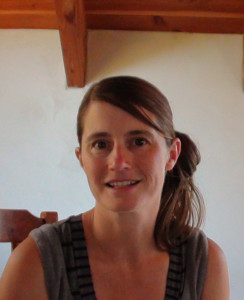By Kathryn Harper
When my son grows up he would like to be a spy, a fireman or a cowboy. My daughter thinks she would like to be a vet.
I had many dreams when I was a child about what I might do or be when I was grown up. Becoming an author featured quite highly – along with artist, and I’m sure I went through stages of thinking I might be a teacher, an air hostess and even a fireman. Despite all of this, more than anything, I dreamed that when I grew up I would be just like everybody else.
When I grew up, I wanted to be able to talk to people. I wanted to feel understood and I wanted to be able to answer all those questions I couldn’t answer when I was small. I dreamed and dreamed of what I would say when I could, and how I would help people to understand …
Why are you so quiet?
When I was young I was always being asked questions: “Why don’t you talk? Why are you so quiet?”
I never understood why people asked me those questions so often. I didn’t talk normally, so pushed with such a question, the chances I might answer were significantly less than zero.
Inside my head, a question like this would have me screaming.
My emotions would bubble up and threaten to take over, as my rigid body stood in shock, with wide eyes staring into nothing in particular, or focussing lazily on a particular section of the floor. The words would echo over and over and over, until it felt like thousands of people were standing around me, each one of them demanding an answer.
At the same time, my world would slow, and I was aware of my heart beating through my whole body. Sometimes it felt like it took over the room, every one else was moving in slow, blurry, jolting movements as my heart’s drumming filled my ears. Tears would prick my eyes, and words would flood into my throat.
My throat, closed tight, gave nothing away. No matter how I tried, I couldn’t answer those questions. Sometimes my mouth would open and close fruitlessly. The words just wouldn’t follow.
I wished that they would.
I wished I could talk like everybody else.
What is Selective Mutism?
I didn’t know it at the time, but when I was younger I suffered from Selective Mutism, an anxiety disorder in which the sufferer finds it impossible to talk in certain situations (even though they can talk fluently in situations where they feel more comfortable). This condition is much more common than is widely known, and it is believed that somewhere between 1:1000 to as many as 1:100 children may suffer to some degree.
Many people mistakenly believe that people like me are choosing not to speak, but it really isn’t like this at all.
The body becomes swamped with fear and anxiety, and the vocal chords are literally frozen. Speech is not possible until the anxiety is lessened – and so finding situations and spaces in which a selective mute person feels comfortable is a crucial part of helping them to recover. No amount of asking, persuading, questioning or demanding will help.
More than just shy.
I always assumed I was shy or quiet. That’s what other people seemed to think – and I figured they must be right. However, sometimes I compared myself to other shy or quiet people and somehow something didn’t seem right.
I didn’t feel shy or quiet the way that other people were shy or quiet. I felt like there was more than this going on. I felt different, and even a little wrong.
I imagine many selective mute children might be mistaken as being shy – but hoping a selective mute child might grow out of it like shy children often do is only likely to make things worse. The earlier a child is identified as being selective mute, and given ways to manage their anxiety, the better.
Working with selective mutism.
I always longed to feel like I was being heard. I understood that communication was about a lot more than the words that I couldn’t say, but it didn’t seem like many people were able to listen in the way I needed them to.
I longed for someone who could sense the overwhelm and anxiety I felt; someone who would take me away from the over-stimulating environments that caused my voice to shut itself down. I longed to feel acknowledged and accepted for the communication that I could manage – and I longed for the pressure to disappear.
I do not know a lot about the sliding in process that is often used to help selectively mute children today, but from what I am able to grasp, this is a way of communicating to children that you can hear them the way I once craved.
Reducing anxiety provoking stimuli and gradually expanding the comfortable space for the child to eventually include other people is something that slowly and respectfully helps the sensitivity of selective mute children to adjust. I have heard of it being used with much success, and it makes sense to me why it works.
How I found my voice.
I found my own ways to cope as a child – and managed to begin talking to meet the expectations of other people. At the time it served its purpose, as I was no longer mute – but the implications were that I would have to spend a good portion of my adult life reconnecting with my real voice and the words that I wanted to say.
Today, I still sometimes find it difficult to talk. Words still get stuck on their way out, and sometimes I feel like I lose them completely. Sometimes what I want to say comes out as something that doesn’t quite sound like I wanted it to. Sometimes, words just fall out of my mouth, and they don’t appear to make any sense.
Other times I still can’t say anything at all.
I am learning that all of this is okay. Whether I can or can’t talk; whether people like it or they don’t; whether I am understood or judged harshly … what really matters is how I feel inside of myself, and acknowledging how far I have come.
Once upon a time I wanted many things for myself, and today I find myself living my dream. I am an author and illustrator who can talk to people in ways that help them to understand. I am reconnecting with my words, and all the time I am expanding the walls of my comfortable place.
People might still describe me as quiet, and perhaps I am in many ways, but I am no longer asked to explain myself. I do, however, feel compelled to share my explanations anyway. All those unanswered questions from my past have been asked of many other people too. Perhaps someone will find what they are looking for in my answers.
 “It feels like a purpose of mine to connect with my past and turn it into stories and lessons that will help both children and adults to Love the life they have.”
“It feels like a purpose of mine to connect with my past and turn it into stories and lessons that will help both children and adults to Love the life they have.”



You describe Selective Mutism so well and as a parent of a SM child I have shared this with my friends to bring awareness to such a debilitating disorder that is sadly misunderstood for shyness (if only!). Thank you.
I found this ebook to be massively informative about SM. It’s written by a person who had SM so it kind of takes you behind the scenes!
https://www.amazon.com/dp/B01N7QBBMO
I also hope to bring awareness to SM by being an advocate for it one day 🙂
Thank you for this post. I appreciate it was written years ago, but would someone be able to share what the recommended book is? The amazon link no longer seems to work. Thank you!
Hey, I just wanted to say what you wrote about selective mutism was so beautifully written and I haven’t found a single thing i could relate to so much until I found this article thank you so much wow
I realize that this comment was made quite a while ago, but if you happen to see this, I found this ebook to be massively informative about SM.
https://www.amazon.com/dp/B01N7QBBMO